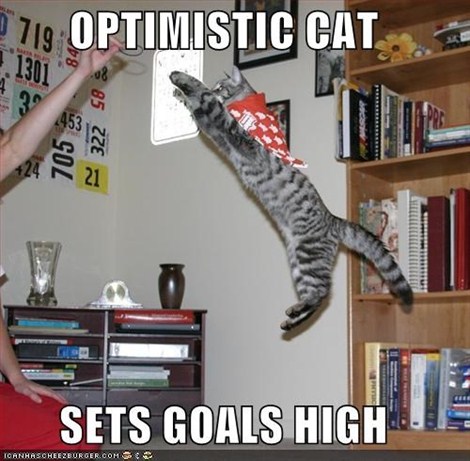Social media day 2013
June 30 is Social Media Day across the World. To celebrate we're giving you 10 tips for a healthy headspace. Represented by cats.
1. Set goals

Setting and achieving goals can be incredibly motivating, and can help build self-confidence, increase your general level of contentment and mental health.
2. Help others

Do something to help someone else. Acts of kindness help other people but also make us feel good and the effects stay with us. We are often happiest when doing something for others.
3. Play

Play is important for staying mentally healthy. Devoting time to just having fun can recharge your battery, revitalise your social networks, and reduce stress/anxiety.
4. Sleep well

5. Eat well
A good night's sleep helps both mental and emotional resilience, while chronic sleep disruptions could increase negative thinking and emotional vulnerability.

A good balanced diet will make sure you have all the essential nutrients needed for your brain to function well, helping to keep you both physically and mentally healthy.
6. Be self-reflective

7. Relax
There are many ways to stop and think about yourself and where you are at. It may be through writing, talking, reading self-help books etc. Examine where you are in life, where you want to be, and where you've come from. Be honest and complimentary to yourself.

8. Exercise
There are many benefits associated with deep relaxation including: decreased levels of anxiety, time for recovery from the effects of stress, increased energy and productivity, improved sleep patterns, decreased prevalence of muscle tension and headaches.

Physical exercise is good for our mental health and for our brains. Exercise seems to have an effect on certain chemicals (dopamine and serotonin) in the brain. Any exercise is better than none. A moderate level of exercise seems to work best.
9. Conflict and resolution

Conflict is difficult for most people. There are times where it may not be possible to avoid. Practising skilful conflict resolution can make a difference and with the skills gained they may have additional benefits. Conflict does not have to be aggressive, discussing and talking through issues can benefit your own wellbeing.
10. Seek help

A problem can sometimes be too hard to solve alone - or with friends and family - so it's important to seek professional help. You can see your family doctor, a community group, a psychiatrist, nurse, occupational therapist, psychologist, social worker or counsellor. All of which can be found at a headspace centre or online at eheadspace.
Find even more tips for a healthy headspace (without cats though).
